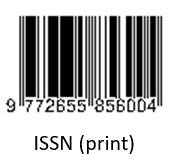Pre-service Science Teachers’ Competence and Confidence in Scientific Inquiry
(1) Sanata Dharma University
(*) Corresponding Author
Abstract
The objective of this study was to examine students’ competence and confidence in scientific inquiry. 42 pre-service science teachers were involved in completing a questionnaire. Data collected were analyzed using Rasch modeling. The results of data analysis show that mean of the Rasch score for students’ competence (1.76 Logits; SD = 1.20) is higher than the mean of the Rasch score for students’ confidence (1. 41 Logits; SD = 1.01). These results show that although students feel competent to do inquiry, they do not yet fully have the confidence to carry out inquiry learning with students in classroom activities. Implications for a science teacher and pre-service science education based on these results are discussed.
Full Text:
PDFReferences
R. K. Alwardt, “Investigating the transition process when moving from a spiral curriculum alignment into a field-focus science curriculum alignment in middle school”. Lindenwood University, 2011.
R. Rohandi and A. N. Zain, "Incorporating Indonesian Students'" Funds Of Knowledge" Into Teaching Science To Sustain Their Interest In Science," Bulgarian Journal of Science & Education Policy, 5(2), 2011.
C. C. Selby, "What makes it science," Journal of College Science Teaching, 35(7), 8-11, 2006.
S. Abell, G. Anderson, and J. Chezem, "Science as argument and explanation: Exploring concepts of sound in third grade," Inquiry into inquiry learning and teaching in science, 100-119, 2000.
J. Hinrichsen, D. Jarrett, and K. Peixotto, "Science inquiry for the classroom: A literature review," Programme Report. Oregon: The Northway Regional Educational Laboratory, 1999.
H.-P. Chang, C.-C. Chen, G.-J. Guo, Y.-J. Cheng, C.-Y. Lin, and T.-H. Jen, "The development of a competence scale for learning science: Inquiry and communication," International Journal of Science and Mathematics Education, 9(5), 1213-1233, 2011.
J. Linacre, "A User’s guide to Winsteps-ministep: Rasch-model computer programs. Program Manual 3.68. 0," Chicago, IL, 2009.
S. K. W. Chu, R. B. Reynolds, N. J. Tavares, M. Notari, and C. W. Y. Lee, 21st century skills development through inquiry-based learning from theory to practice. Springer, 2021.
C. C. Kuhlthau, L. K. Maniotes, and A. K. Caspari, Guided inquiry: Learning in the 21st century: Learning in the 21st century. Abc-Clio, 2015.
Irwanto, A. D. Saputro, E. Rohaeti, and A. K. Prodjosantoso, "Using inquiry-based laboratory instruction to improve critical thinking and scientific process skills among preservice elementary teachers," Eurasian Journal of Educational Research,19(80), 151-170, 2019.
A. Stavrianoudaki and A. Smyrnaios, "Effects of inquiry-based learning cooperative strategies on pupils’ historical thinking and co-creation," in Education beyond crisis: Brill, 300-315, 2020.
A. Mutlu, "Evaluation of students’ scientific process skills through reflective worksheets in the inquiry-based learning environments," Reflective Practice, 21(2), 271-286, 2020.
DOI: https://doi.org/10.24071/ijasst.v4i2.5428
Refbacks
- There are currently no refbacks.
Publisher : Faculty of Science and Technology
Society/Institution : Sanata Dharma University

This work is licensed under a Creative Commons Attribution 4.0 International License.












